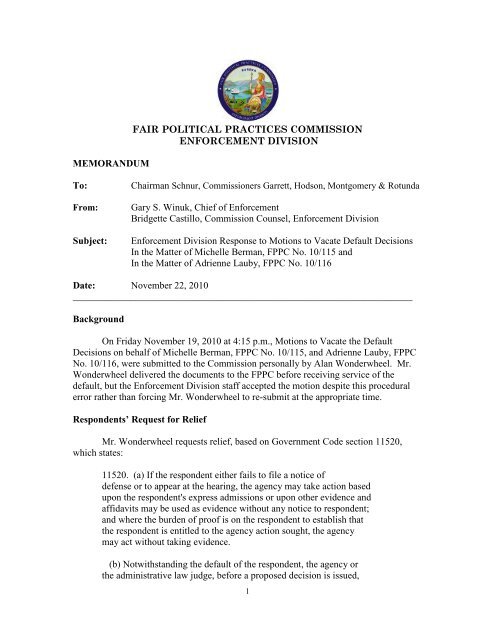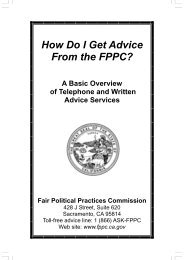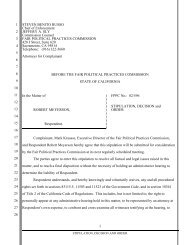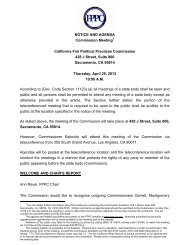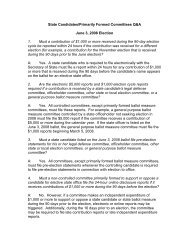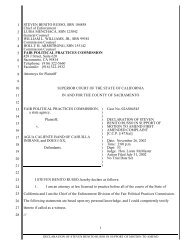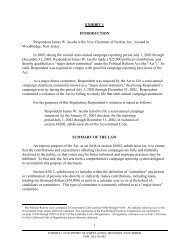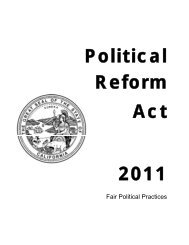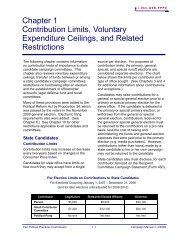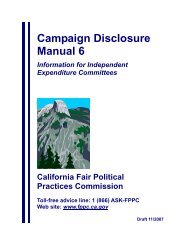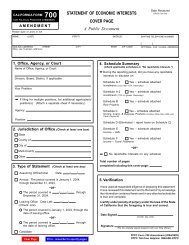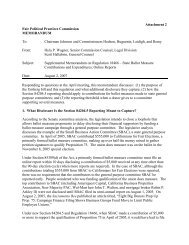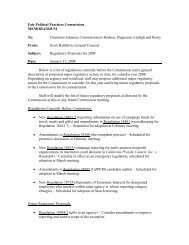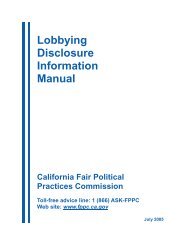Memorandum - Fair Political Practices Commission
Memorandum - Fair Political Practices Commission
Memorandum - Fair Political Practices Commission
Create successful ePaper yourself
Turn your PDF publications into a flip-book with our unique Google optimized e-Paper software.
MEMORANDUM<br />
FAIR POLITICAL PRACTICES COMMISSION<br />
ENFORCEMENT DIVISION<br />
To: Chairman Schnur, <strong>Commission</strong>ers Garrett, Hodson, Montgomery & Rotunda<br />
From: Gary S. Winuk, Chief of Enforcement<br />
Bridgette Castillo, <strong>Commission</strong> Counsel, Enforcement Division<br />
Subject: Enforcement Division Response to Motions to Vacate Default Decisions<br />
In the Matter of Michelle Berman, FPPC No. 10/115 and<br />
In the Matter of Adrienne Lauby, FPPC No. 10/116<br />
Date: November 22, 2010<br />
______________________________________________________________________<br />
Background<br />
On Friday November 19, 2010 at 4:15 p.m., Motions to Vacate the Default<br />
Decisions on behalf of Michelle Berman, FPPC No. 10/115, and Adrienne Lauby, FPPC<br />
No. 10/116, were submitted to the <strong>Commission</strong> personally by Alan Wonderwheel. Mr.<br />
Wonderwheel delivered the documents to the FPPC before receiving service of the<br />
default, but the Enforcement Division staff accepted the motion despite this procedural<br />
error rather than forcing Mr. Wonderwheel to re-submit at the appropriate time.<br />
Respondents’ Request for Relief<br />
Mr. Wonderwheel requests relief, based on Government Code section 11520,<br />
which states:<br />
11520. (a) If the respondent either fails to file a notice of<br />
defense or to appear at the hearing, the agency may take action based<br />
upon the respondent's express admissions or upon other evidence and<br />
affidavits may be used as evidence without any notice to respondent;<br />
and where the burden of proof is on the respondent to establish that<br />
the respondent is entitled to the agency action sought, the agency<br />
may act without taking evidence.<br />
(b) Notwithstanding the default of the respondent, the agency or<br />
the administrative law judge, before a proposed decision is issued,<br />
1
has discretion to grant a hearing on reasonable notice to the<br />
parties. If the agency and administrative law judge make conflicting<br />
orders under this subdivision, the agency's order takes precedence.<br />
The administrative law judge may order the respondent, or the<br />
respondent's attorney or other authorized representative, or both, to<br />
pay reasonable expenses, including attorney's fees, incurred by<br />
another party as a result of the respondent's failure to appear at<br />
the hearing.<br />
(c) Within seven days after service on the respondent of a<br />
decision based on the respondent's default, the respondent may serve<br />
a written motion requesting that the decision be vacated and stating<br />
the grounds relied on. The agency in its discretion may vacate the<br />
decision and grant a hearing on a showing of good cause. As used in<br />
this subdivision, good cause includes, but is not limited to, any of<br />
the following:<br />
(1) Failure of the person to receive notice served pursuant to<br />
Section 11505.<br />
(2) Mistake, inadvertence, surprise, or excusable neglect.<br />
Mr. Wonderwheel requests the default decisions for both Respondents, Michelle<br />
Berman and Adrienne Lauby, be vacated and the Enforcement Division be directed to<br />
accept the untimely Notice of Defense for each Respondent and allow them to have a<br />
hearing before an Administrative Law Judge.<br />
Enforcement Division Responses to Respondent’s Law and Argument<br />
Respondent’s Argument 1:<br />
Mr. Wonderwheel requests the <strong>Commission</strong> to vacate the default decision due to<br />
his “mistake, inadvertence, surprise or excusable neglect.” This issue was considered by<br />
the <strong>Commission</strong> before issuing the default decision at the November 12, 2010<br />
<strong>Commission</strong> hearing.<br />
Mr. Wonderwheel contends that it is an “abuse of discretion” by the FPPC to<br />
deny his request, based on California Code of Civil Procedure (CCP) 473 (b), which<br />
requires a court to vacate a civil default judgment upon a showing of good cause, which<br />
includes the mistake, inadvertence, surprise or excusable neglect of a respondent’s<br />
attorney. However, CCP 473 (b) is inapplicable to the proceedings of the FPPC, which<br />
are governed by the Administrative Procedures Act (APA) at Government Code Section<br />
11370 et seq. The APA provides the <strong>Commission</strong>, in Section 11520 with the discretion<br />
as to whether or not to grant a hearing for good cause when a respondent is in a default<br />
setting.<br />
2
Further, no new facts have been presented by Mr. Wonderwheel since the<br />
November 12, 2010 hearing, where the <strong>Commission</strong> considered these issues before<br />
approving a default decision.<br />
Respondent’s Argument 2:<br />
Mr. Wonderwheel requests that the default decisions be vacated due to his client’s<br />
“mistake inadvertence, surprise or excusable neglect” due to their good faith reliance on<br />
his duty to timely file a Notice of Defense on their behalf under Government Code<br />
Section 11520. Similar to his argument in Respondent’s Argument 1, Mr. Wonderwheel<br />
argues that it is an “abuse of discretion” by the FPPC to refuse to vacate the decision.<br />
Once again, Section 11520 provides, in subsection (c), that the FPPC retains the<br />
discretion to vacate a default decision, if good cause is shown. The <strong>Commission</strong> is not<br />
required to and may exercise its judgment as to whether or not to grant the motion. The<br />
<strong>Commission</strong> considered the facts and arguments presented at the November 12, 2010<br />
hearing and did not grant Respondents’ request at that time before approving a default<br />
decision for each Respondent.<br />
Further, no new facts have been presented by Mr. Wonderwheel since the<br />
November 12, 2010 hearing on this issue.<br />
Respondent’s Argument 3:<br />
Mr. Wondewheel contends that the FPPC further abused its discretion by<br />
“prejudging the outcome of a fair hearing before a neutral hearing officer.” He contends<br />
that the FPPC should have limited its discussion at the November 12, 2010 hearing solely<br />
to his request to have his clients be granted a hearing before an Administrative Law<br />
Judge.<br />
However, Mr. Wonderwheel completely misunderstands the character of the<br />
proceedings which the <strong>Commission</strong> was undertaking. The item that was on the<br />
<strong>Commission</strong>’s agenda was whether to approve, modify or disapprove the proposed<br />
default decision and order and accompanying exhibit for FPPC Cases No. 10/116<br />
(Lauby) and FPPC 10/115 (Berman).<br />
Mr. Wonderwheel presented his remarks during the public comment period of his<br />
client’s default agenda items, where he requested the default decisions not be entered.<br />
However, under Government Code Section 11520, a motion to vacate a default judgment<br />
is not timely filed until after the default decision is entered. Thus, although the<br />
<strong>Commission</strong> generously discussed Mr. Wonderwheel’s issues related to his misconduct<br />
in failing to represent his clients competently, the issue at hand was the default decision<br />
and proposed penalty itself.<br />
3
In considering the issue as properly placed on the agenda, the <strong>Commission</strong> had<br />
the authority under Section 11520 (a) to take action based upon the respondents’ express<br />
admissions or upon other evidence. The <strong>Commission</strong> properly took action based on the<br />
Respondent’s express admissions, the evidence detailed in the Exhibit, the Respondent’s<br />
own public comments at the <strong>Commission</strong> hearing, and the evidence presented by the<br />
Enforcement Division. The <strong>Commission</strong>, although not required to, further generously<br />
allowed Mr. Wonderwheel, Ms. Berman and Ms Lauby to provide any documents or<br />
statements they wished. Neither provided any exculpatory evidence or statement of any<br />
type. Both were permitted to present any mitigation factors they wished for the<br />
<strong>Commission</strong>’s consideration.<br />
Mr. Wonderwheel’s motion tries to turn the November proceedings on their<br />
head by suggesting that, because of his misconduct, the <strong>Commission</strong> hearing should have<br />
been altered, with no notice to either the public or the FPPC staff, to discuss his untimely<br />
motion only and not consider the properly scheduled agenda item. The <strong>Commission</strong><br />
rightly considered the item as placed on the agenda and, in its discretion, also considered<br />
Mr. Wonderwheel’s request. The <strong>Commission</strong> then took action well within its authority.<br />
Additionally, the Respondents had months to provide the Enforcement Division<br />
with any exculpatory or mitigating evidence and have failed to do so. They also have had<br />
the intervening period between the November and December <strong>Commission</strong> hearings to<br />
provide such information and have failed to do so.<br />
Respondent’s Argument 4:<br />
Mr. Wonderwheel contends that the default decision should be set aside because<br />
the FPPC “abused its discretion” by establishing a policy that does not allow the granting<br />
of hearings at the default stage for any reason. However, he makes completely false<br />
statements about the <strong>Commission</strong>’s position and “policy” with regard to the exercise of<br />
its authority and discretion under Section 11520.<br />
At the November 12, 2010 hearing the <strong>Commission</strong> exercised its discretion in<br />
these two cases to not allow Respondents a hearing due to the failure of their attorney to<br />
file their Notice of Defense within the timeframe established by the APA. The<br />
<strong>Commission</strong> did not vote on, give direction to staff or make any statement that no future<br />
requests for a showing of good cause under Section 11520 would be considered, or that<br />
such a policy existed or would be considered. Any statements made simply identified the<br />
need of the <strong>Commission</strong> to be cognizant of treating similarly situated respondents<br />
consistently and fairly as one factor in the decision-making process.<br />
In fact, the Enforcement Division at the September 2010 hearing requested a<br />
default agenda item be pulled from the agenda in order to provide an Administrative<br />
Hearing for the Respondent in that case. However, the factual circumstances involved<br />
there, a question as to whether respondent received proper notice of the hearing, were<br />
different from those at issue here. The <strong>Commission</strong> has thus demonstrated by its actions<br />
4
that it does not have a blanket policy of rejecting any requests for hearings for default<br />
items on the agenda, but rather properly exercises its discretion consistent with the APA.<br />
Enforcement Division Recommendation<br />
While the <strong>Commission</strong> has the discretion to vacate the Default Decisions, the<br />
Enforcement Division recommends that these requests be denied for the reasons<br />
previously detailed.<br />
5


